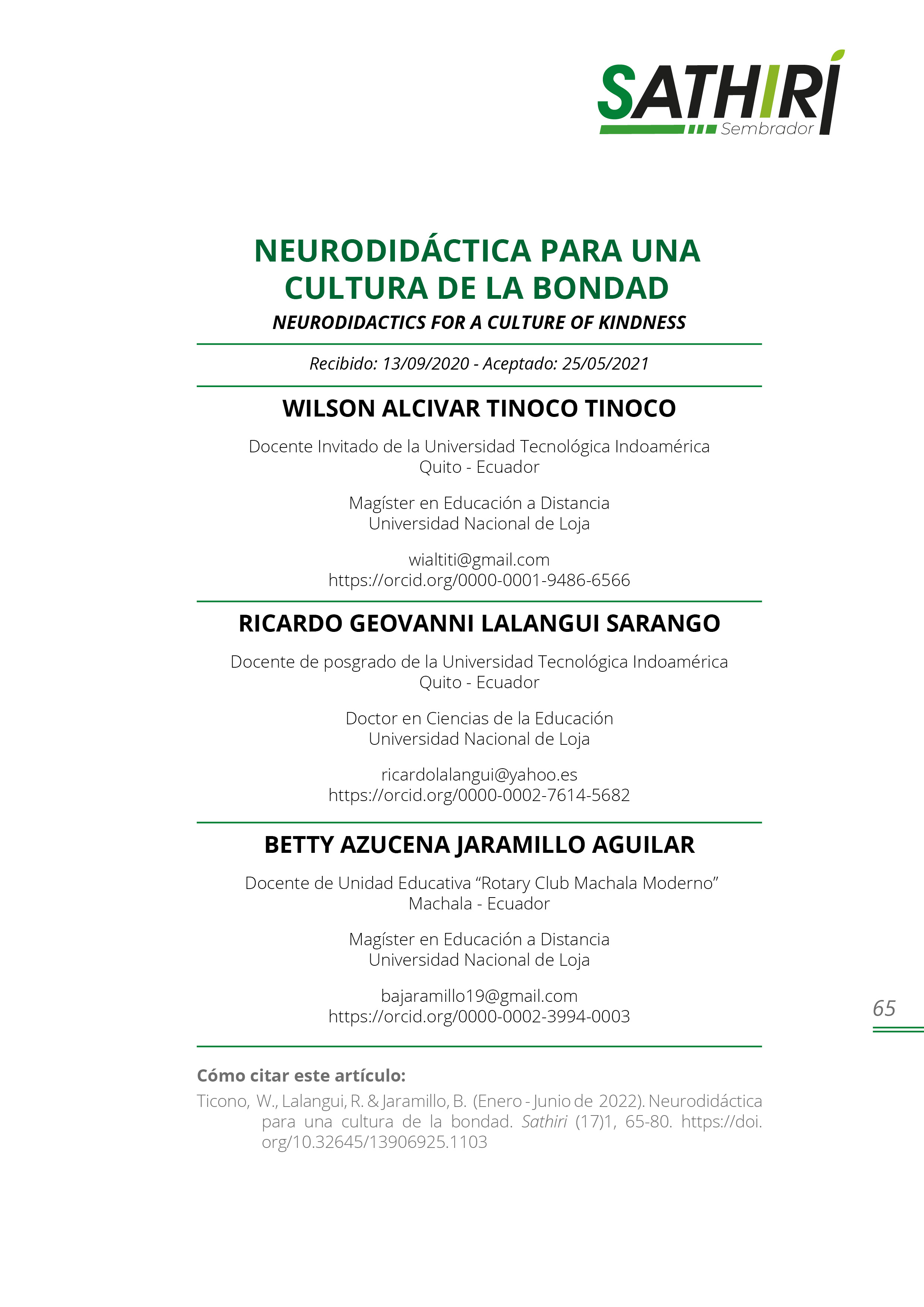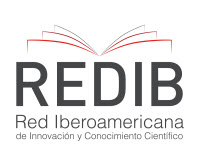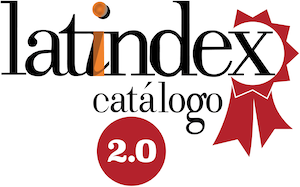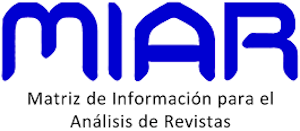Neurodidactics for a culture of kindness
DOI:
https://doi.org/10.32645/13906925.1103Keywords:
neurodidactics, emotions, learning, goodAbstract
The present research is intended to highlight the importance of neurodidactics, especially in terms of emotions and their incidence on learning. As well as to understand that it is necessary to educate for a culture with good practices that begins with the value of the person without distinction of his condition or origin and considering his fundamental aspects of life such as the material, somatic, psychological, and spiritual. The research approach is mixed, not experimental, it is bibliographic, descriptive, and field in nature. To obtain the empirical information, a survey, based on a questionnaire of six questions, was applied to the whole teaching population of “Combate de Pilo” School and “Matilde Hidalgo de Procel” High School, both public institutions in Machala city, El Oro Province. This information allowed to conclude that respondents showed serious problems in terms of knowledge of neurodidactics. Most of them (82.36%) believed that it is a contribution of pedagogues and teachers, which is false because this is a benefit of the neuroscience. Likewise, it was detected that educators gave importance to emotions, there is even an adherence. They assured that it is decisive to achieve a cultural change, but they denied when informing that “doing good” consists on improving people’s material conditions and food. These variations denoted that something is happening on teachers’ training. Therefore, it is recommended to create opportunities for pedagogical instruction, self-preparation, reflection on teaching practice, and spiritual growth.
References
Aramburuzabala, Pilar; Cerrillo, Rosario; Tello, Inmaculada. (2015). Aprendizaje-servicio: una propuesta metodológica para la introducción de la sostenibilidad curricular en la universidad, Universidad Autónoma de Madrid.
Benavides, V., & Flores, R. (2019). La importancia de las emociones para la neurodidáctica.
Bueno, D., & Anna, F. (2018). 5 Principios de la Neuroeducación . Revista Iberamericana de la educación , 20.
Campos, A. (2015). Neurociencias y Educación: Una puerta abierta hacia el desarrollo humano. Obtenido de https://web.oas.org/childhood/ES/Lists/Temas%20%20Proyectos%20%20Actividad%20%20Documento/Attachments/516/14%20Ponencia%20Anna%20Luc%C3%ADa.pdf
Campos, M. (2017). Métodos de investigación académica. Obtenido de http://www.kerwa.ucr.ac.cr/bitstream/handle/10669/76783/Campos%20Ocampo,%20Melvin.%202017.%20M%C3%A9todos%20de%20Investigaci%C3%B3n%20acad%C3%A9mica.%20(versi%C3%B3n%201.1).%20Sede%20de%20Occidente,%20UCR.pdf?sequence=1
Cepeda Ortega, J. (30 de Octubre de 2017). Una aproximación al concepto de identidad cultural . Obtenido de DOI: https://doi.org/10.24197/trp.31.2018.244-262
D’Addario, M. P. (2019). Educación y Neurociencia, Tratados, análisis, neuroaula y ejercicios. Comunidad Europea: creative.
Dweck, C. (12 de septiembre de 2018). Obtenido de https://www.youtube.com/watch?v=cBYMq_gPULc
Friedrich, G., & Preiss, G. (2003). Neurodidactica.
Furman, M. (2019). Guía para criar hijos curiosos. . Buenos Aires : Siglo veintiuno.
Goleman, D. (1998). La Inteligencia emocional . Buenos Aires: Grupo Zeta. .
Gómez Pellón, E. (2007). El concepto de Cultura. En E. Gómez Pellón, Introducción a la antropología social y cultural. Cantabria, España:Creative Commons.
Gómez Pellón, E. (2007). El concepto de Cultura. En E. Gómez Pellón, Introducción a la antropología social y cultural. Cantabria, España:Creative Commons.
Hernández, R., Fernández, C., & Baptista, M. (2014). Metodología de la Investigación. México: McGRAW-HILL.
Hernández-Carrera, R. M. (2019). Didáctica General. Universidad Internacional de la Rioja .
Jiménez, V. (2012). El concepto de “Cultura” en el siglo XVIII. Obtenido de https://www.ugr.es/~inveliteraria/PDF/CULTURA.pdf
Kolb, B., & Whishaw, L. (2011). Neuropsicologia Humana. Madrid: Panamericana.
Mallart Navarra, J. (2001). Didáctica: concepto, objeto y finalidades.
Paniagua G, M. N. (2013). Neurodidactica: una nueva forma de hacer educación. Fides Et Ratio, Pag.4.
Ron, J. (1977). Sobre el Concepto de Cultura. Quito: ADAP.

Downloads
Published
Issue
Section
License
Copyright (c) 2022 Wilson Alcivar Tinoco Tinoco, Ricardo Geovanni Lalangui Sarango, Betty Azucena Jaramillo Aguilar

This work is licensed under a Creative Commons Attribution-NonCommercial-NoDerivatives 4.0 International License.
El autor mantiene los derechos morales e intelectuales de su obra, autorizando a la editorial de la revista Sathiri la difusión y divulgación de su contenido con fines estrictamente académicos y de investigación, sin fines de lucro. Así mismo, se autoriza que la obra sea descargada y compartida con otras personas, siempre y cuando no sea alterada y se reconozca su autoria.




















